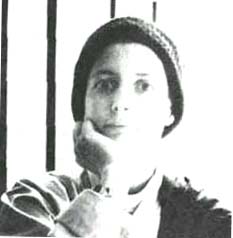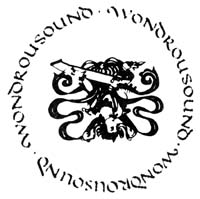|
teachings Later, while
translating, it occurred to me that these principles could be put into songs,
so I tried it. It turned out to be exciting, and so I have continued I started
writing songs because I had something to say and it seemed to me that music was
an excellent vehicle.
Susan: When you write, which comes first, the music
or the words?
Heng-yin: I translate Chinese,
spoken lectures based on ancient texts, and I work with tapes. As I hear the
Chinese I type it directly into English. Sometimes I will hear something so
inspiring, I will take out my manuscript and type it as a poem. Later on I’ll
find a tune for it and so it becomes a song. In Buddhism there are many
technical terms and things for students to memorize. If you can put the
information into a song, then it's no trouble to learn it.
Susan: Listening to your songs, they sound very
Western, not Eastern as one might imagine. There are no drums or bells as one
might expect—why?
Heng-yin: I guess it's because I am
Western' Although we do mantras and other forms of chanting in Chinese,
Buddhism doesn't belong to any particular nationality. Consequently, there is
nothing strange about "Western" Buddhist music. Buddhism appeared in
India and went to China where the teachings were adapted to the Chinese
culture. Now that it has come to the West and the teachings are being translated
into English, it is appropriate for it to take a Western form in order to reach
Western people. Buddhism belongs to everyone. One of the major teachings in
fact is that every living creature has a Buddha nature and can realize
Buddhahood, that is, the perfection of the spirit. The Buddha himself expressed
the wish that wherever his teachings went, they be put in the language of the
people.
Susan: Do you prefer singing songs for Buddhism to
mantras, meditation or other activities?
Heng-yin: In Buddhism, essentially
the work is to purify your own mind to get rid of greed, anger, and delusion.
There are many ways to approach this work—through mantras, meditation, study,
etc., but (hey all serve the same purpose. I don't think that any one method is
higher than any other. It depends on the disposition of the person. One person
may use several methods. The songs are obviously a more popular form, an
inspirational and teaching device, but I wouldn't say I preferred them to other
forms of cultivation.
Susan: What would you tike to have happen to your
songs? You've got a songbook published, you've made a tape and now an album.
What would you hope for them?
Heng-yin: When I decided to study
Buddhism, It was because I saw that everything in this world was false. Even
though you may enjoy yourself for a while, it's only temporary, and that means
it's painful. People have to be born and they have to die and they don't really
know where they came from or, when they die, where they are going. That's a big
problem. The Buddhadharma recognizes this problem and furnishes us with tools
to help us break through our confusion, to break our attachments to ignorance
and desire. When I first heard the Dharma. It sounded very true to me. I felt a
great deal of enthusiasm for wanting others to hear it too, so that's probably
the object of my songs—it there is one.
One thing I noticed very early in life, maybe when I
was nine or ten, was that, "Wow. All these songs are about love-love, love!
Aren't there songs about anything else?" I wrote the songs because I would
like people to consider a different viewpoint on the world, and not feel
compelled to live just for the satisfaction of their desires. The more you run
after objects of desire, the more pain you must undergo. Basically within the
natures of all of us is everything we need.
Susan: Could you describe a little bit of your day?
You're busy constantly, I imagine. Just give us an idea of what you do.
Heng-yin: We get up at tour in the
morning and chant (or an hour. Then there's meditation. Afterwards I translate
or teach. Most of the monks and nuns eat only one meal a day. The Buddha
recommended this as something especially good for cultivation.
Susan: When do you get a chance to compose?
Heng-yin: When I take the time!
Susan: Would you perform?
Heng-yin: Probably.
Susan: With a back-up group?
Heng-yin: Sure.
Susan: How do
you think the American public is going to react to your music?
Heng-yin: I really don't know. When the
time is right for something to happen, it can happen, but I haven't really
thought about the future. I'm just doing the music like I do my other
work—because that's my job. I do think the songs—not necessarily my voice, but
the message in the songs, could be helpful to people Hopefully they interpret
the Buddhadharma correctly Music has a tremendous power to move people, and I
hope to move them in the right direction, away from greed and anger towards
wisdom. What happens in the future I'll just have to deal with when it happens.
When Buddhism went to China it was several hundred
years before it hit the mainstream of the population, but now in Asia its
principles are all pervasive Everyone knows about the laws of cause and effect
and the six paths of rebirth, filiality, and so on Buddhism is just getting
started in America, with people actually doing the work of cultivation and
translating the teachings into English. It may be a while before it reaches the
popular level, but the songs can be a stepping stone in that direction.
|

